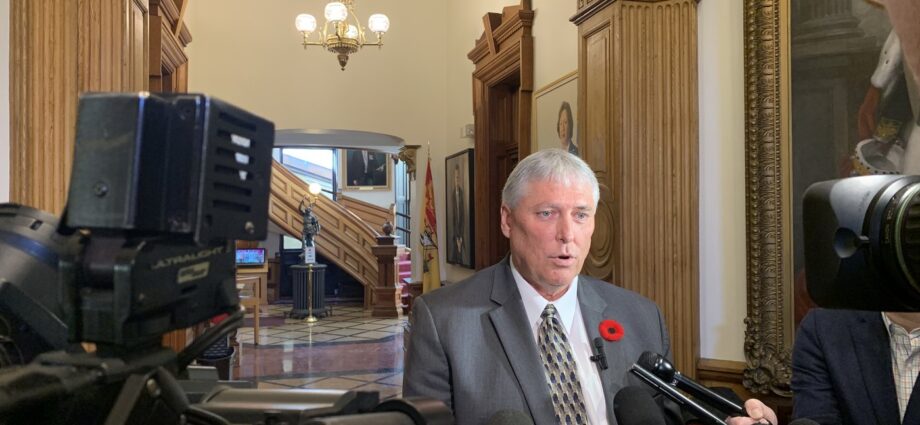
By John Chilibeck, Local Journalism Initiative Reporter, The Daily Gleaner
February 19, 2024
New Brunswick’s transportation minister is tearing a strip off the federal environment minister for saying Ottawa will no longer pay for new roads as part of its fight against global warming.
Richard Ames released a statement Thursday that added to the chorus of boos from conservative politicians across the country.
“While calling for greater use of public transit and other active forms of transportation are options in large cities and urban centres, they are not options in primarily rural jurisdictions such as New Brunswick,” Ames said in the statement released by his Progressive Conservative government.
“Our government continues to take a responsible approach to spending by focusing on maintaining and improving existing infrastructure.”
Environment Minister Steven Guilbeault said last week the Trudeau Liberal government would no longer invest in big new road projects.
“Our government has made the decision to stop investing at the federal level in new road infrastructure,” Guilbeault said in a benefit-luncheon speech, addressing by video a gathering in Montreal organized by public transit advocacy group Trajectoire Québec.
“Of course, we will continue to be there for cities, provinces and territories to maintain the existing network, but there will be no more envelopes from the federal government to enlarge the road network. The analysis we have done is that the network is perfectly adequate to respond to the needs we have. And thanks to a mix of investment in active and public transit, in territorial planning and densification, we can very well achieve our goals of economic, social and human development without more enlargement of the road network.”
Those comments, published in the Montreal Gazette, drew critical responses from two premiers on social media and the federal Conservative opposition.
Ontario Premier Doug Ford snapped back on X, the platform once know as Twitter.
“I’m gobsmacked. He doesn’t care that you’re stuck in bumper-to-bumper traffic. I do. We’re building roads and highways, with or without a cent from the feds.”
Asked about his comments at a news conference in Ottawa Wednesday, Guilbeault seemed to backpedal somewhat, claiming he only meant the federal government has stopped funding certain types of mega-projects, such as the proposed tunnel under the St. Lawrence River linking Quebec City to Lévis (also called the Troisième Lien, or Third Link).
“I should have been more specific in that conference that I gave (Monday) in Montreal,” he said. “But in that same conference, I specified that we still have funds, obviously, to maintain and enhance our road network across the country.
“I was talking specifically about projects like the Troisième Lien that the CAQ government in Quebec wants to move forward with, which is something myself and many of my Quebec cabinet colleagues have said time and time again. This is not a new policy at all.”
Guilbeault went on to repeat his other point from the public transit conference, which was that replacing gas-powered cars with electric cars will not be sufficient to meet Canada’s climate goals.
“Electrification is not the only solution. It will happen through the massive investments our government is making in public transit -$30 billion in investments. In recent years, more than 400 kilometres of metros and light trains have been added thanks to federal investment, 1,700 kilometres of active transit routes, such as bike paths.”
In Canada, the transportation sector is responsible for 27 per cent of the nation’s greenhouse gases. Almost half of that total is caused by fumes from light-duty vehicles – the cars, vans and light-duty trucks everyday people drive.
Many environmentalists argue that one of the reason Canadians emit more greenhouse gases per person than the global average is our love of automobiles. The nation has a publicly owned road network of more than one million kilometres of two-lane highways, according to Statistics Canada.
Provinces count on Ottawa to fund big highway projects, typically for between one-third and half the costs. Trans-Canada twinning, big bridges, over and underpasses have all received federal dollars in the past, even though strictly speaking provinces are responsible for roads. Commerce and trade are part of Ottawa’s mandate, and it has created infrastructure projects during slow economic times to help create jobs and spur the economy.
Ames said New Brunswick needs federal funding for roads.
“There will be a need for new funding specific to help support growth where our roads intersect with our cities,” he said, citing new developments such as housing, schools, medical services and community centres. “Be it an overpass, a new intersection or roundabout, a bypass road, or adding lanes to existing highways to improve safety and or traffic flow. These are all tools we will need to deploy to build for the population needs of today and into the future.”
Brunswick News asked to speak to Ames on Friday, but the request was ignored.
A spokesperson for the Office of the Minister of the Environment and Climate Change told Brunswick News that the federal minister’s comments had been portrayed inaccurately.
“I would also like to make clear that the minister’s comments signal no change in government policy, and the federal government will continue to work with provincial and municipal partners to build up communities across the country on a wide range of transportation options,” wrote Sean Mitchell in an email.
He said since 2015, the Liberal government has supported 10,833 roadways, under the Canada Community building Fund, representing a federal investment under the program of nearly $4.5 billion.
“This includes the maintenance of roads and bridges, and certain projects deemed to be in the national interest, such as the Gordie Howe Bridge on the Canada-US border.”
Subscribe to our newsletter.
– With files from the Montreal Gazette


